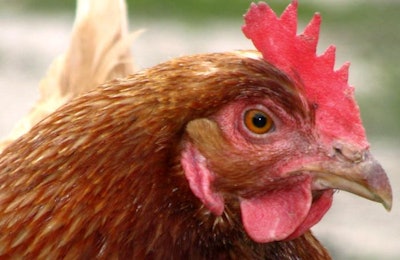
Three further highly pathogenic avian influenza (HPAI) outbreaks have been officially confirmed in Nigeria.
According to the federal agriculture ministry's latest report to the World Organisation for Animal Health (OIE), these involved three farms in central Nigeria. After a number of birds died at each location, the presence of the H5N1 virus variant was confirmed.
At the end of January, the disease hit a mixed flock of 3,675 poultry (mainly laying hens) in the state of Kano. They were part of a cluster of farms that were in the habit of sharing workers and equipment.
The following day, the same virus was detected in another mixed poultry flock of around 7,505 birds near the city of Jos in Plateau state. These were also largely layers. The likely source of infection is not reported.
Around a week later and in the state of Bauchi, elevated mortality was observed in another mixed flock. The owner of the flock near the town of Toro had previously purchased birds from the farm in Plateau.
These outbreaks involved a total of around 13,600 poultry, 695 of which died. The remaining birds have been destroyed, according to the ministry.
In December, HPAI reemerged in Nigeria after an absence of several months last year. The only previously reported outbreak was in a small backyard flock in Kano.
Nigeria puts additional disease control measures in place
Citing official sources, Premium Times reported recently that Nigeria had been free of HPAI for two years.
It added that there had been two confirmed outbreaks in Kano. These were in backyard flocks that comprised ostriches, geese, turkeys, layers and peacocks. Within a week, according to this source, the infection was also discovered in two commercial poultry flocks in the same state, as well as in the region of Jos in Plateau.
Following the sudden rapid spread of HPAI, the federal agriculture ministry warned all poultry owners to be alert for signs of the disease. It is also urging them to maintain high levels of biosecurity, and to avoid movements of poultry and their products.
The ministry has called for all states to activate the HPAI emergency preparedness plan, and to enforce movement controls on birds and all products from infected to unaffected states. Farmers and other in the value chain will be informed about the need for biosecurity. Furthermore, live bird markets for domestic poultry must be separated from those dealing with other bird species, and subjected to regular and vigorous disinfection.
North Africa on high alert for avian flu
Following the recent announcement of the first detection of H5N8 HPAI in Algeria, all of North Africa is now on alert, reports Morocco World News. No cases have yet been reported in Morocco.
Around one month ago, the disease hit a flock of around 50,000 poultry in the northwest Algerian province of Oum El Bouaghi.
Fears about the impacts of a spread of HPAI are not groundless.
As soon as the disease was reported in Algeria, several countries suspended imports of poultry products from the country, according to Canada 24. Among them are Vietnam (which imports chicken feet), Mauritania, and neighboring states. This sudden halt to trade has caused poultry prices to drop sharply in Algeria, and a drop in local demand in some areas.
The same source reports complaints from poultry producers about the delay between the first outbreak and official confirmation. They allege that this gave more opportunities for the virus to spread.
No new HPAI outbreaks in South Africa
According to the latest reports from the South African veterinary authority to the OIE, there have been no recent cases of HPAI linked to the H5N8 virus subtype in the country’s poultry or wild birds.
In poultry, the nation’s first ever outbreak was confirmed in June of 2017. With the most recent cases in November of last year, the number of confirmed outbreaks stands at 219.
No wild birds have tested positive for this virus subtype in South Africa since July of 2019.
By the end of 2021, the poultry sector’s present disease difficulties are forecast to diminish, according to a leading industry analyst. In the meantime, he said, viruses will continue to make this a challenging year.
View our continuing coverage of the global avian influenza situation.

















